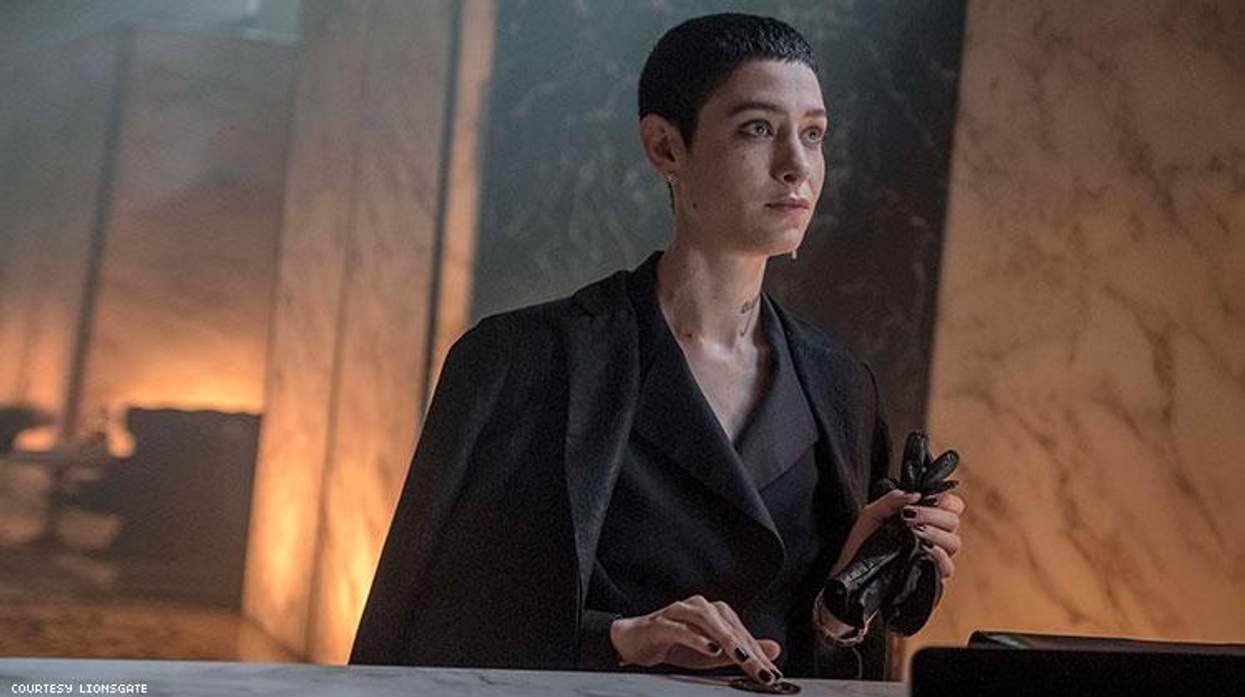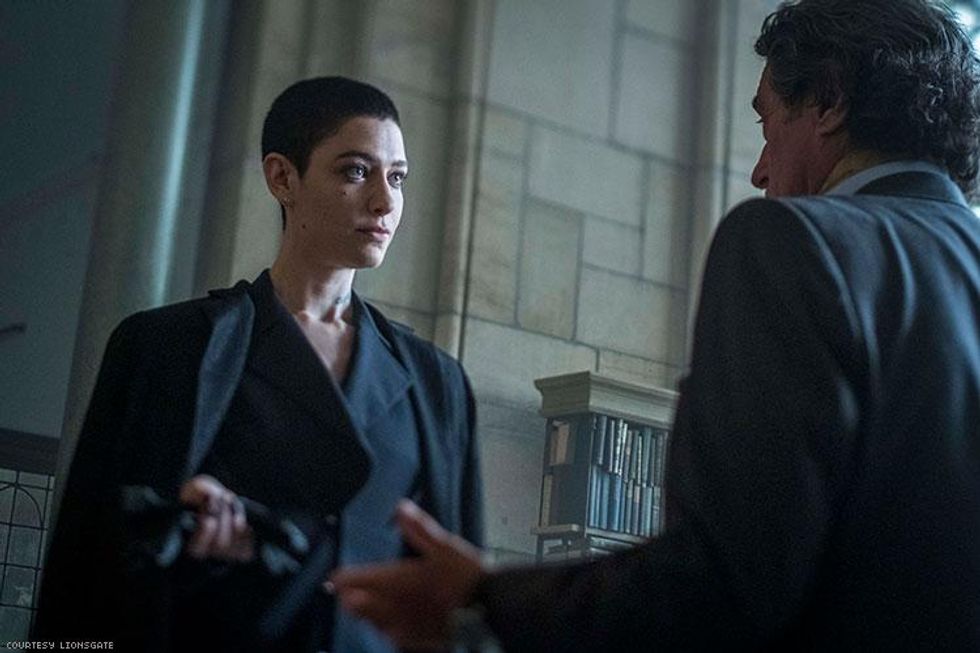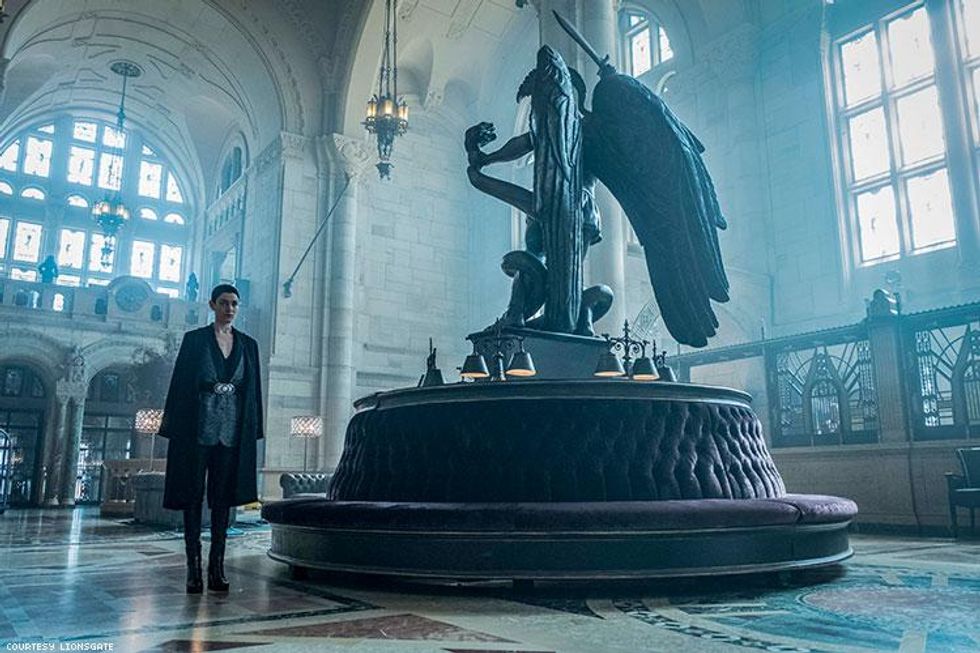John Wick: Chapter 3 - Parabellum showcases a nonbinary actor playing a nonbinary character in a leading role in a major movie. The latest installment of the internationally successful action franchise features Asia Kate Dillon playing the Adjudicator, an uncompromising, authoritative figure sent to deliver ruthless justice when John Wick (Keanu Reeves) and his comrades break the sacred rules of the criminal underworld.
Dillon (who uses they/them pronouns) made history by playing the first nonbinary role on American television as Taylor in Billions and charmingly taught Ellen what it means to be gender-nonbinary. For their latest turn in the action-drenched assassin flick, they need no weapon, as their presence alone commands the room and demands respect. The Advocate spoke with Dillon about the fun of playing an antagonist, how their nonbinary character can affect global audiences, and how the conversation around "gender equality" in Hollywood needs to be more inclusive.
The Advocate: How did you work with director Chad Stahelski to shape your character, the Adjudicator, and was gender identity a part of that discussion?
I met with Chad and then Keanu, they saw a character who was able to walk into a room and unsettle everyone. Even people who you didn't think could be unsettled, like Winston [Ian McShane] and John Wick. And they wanted this character to have a quiet power, a quiet intensity, and a quiet sort of intimidation about them. Because there's nothing in the story that indicates that the Adjudicator had to be a cis person, a gender identity within the binary, I was like, "Well, I'm nonbinary, so let's make this character nonbinary." It's a credit to Chad and Keanu and everyone at Lionsgate that they were like, "Oh, of course." Our world, John Wick, is already a diverse world. I mean from the first film to this one, they've always had people of different ethnicities, different cultural backgrounds of all shapes and sizes and colors, and so for them adding gender diversity to this film was just a no-brainer.
What was your favorite part of playing this powerful antagonist?
Oh, my gosh. Playing a powerful antagonist to unsettle people is fun! Getting to be in scenes with people like Laurence Fishburne and Anjelica Huston, who both have such incredible screen presence already, phenomenally talented, but to be on-screen with them and playing a character that's there to intimidate them and hold more power over them, for me as an actor was like so juicy and fun.
When does anyone have a chance to intimidate Anjelica Houston?!
Right?! That was awesome.

Since there are so few nonbinary characters in movies, what does it mean to you as a nonbinary person to play this character?
I feel really proud and I feel really humbled to be able to play a character on the big screen who would have meant so much to me as a young person. This film, because it has such worldwide acclaim [and] a worldwide fan base, the visibility that can be gained from being in this film is incredible. Therefore my platform is bigger, which means that not only do I get more visibility, but I'm able to bring more visibility and attention to the people who started the gender revolution long before I was born, trans women and gender -nonconforming people of color who still are the most marginalized and the most disenfranchised in the movement they started.
I, Asia, I'm one example of a nonbinary identity. Taylor, who I play on Billions, is another example of a nonbinary identity. The Adjudicator is another example of a nonbinary identity. The more representation we have of what nonbinary can look like across the board, that it's not just for white-bodied, sort of semi-androgynous, assigned-female-at-birth people, but really, it was trans women of color, gender-nonconforming people of color who have been fighting for freedom and visibility. Without whom I would not be able to have the visibility that I have now.
How do you hope your character speaks to nonbinary viewers in parts of the world where they're not able to express themselves?
Gosh. Speaking from the experience with the feedback I've gotten from playing Taylor on Billions, it helps people feel less alone. People who are nonbinary or trans themselves have reached out to me and said, "I felt like I was the only one, and now I know I'm not." Or parents of gender-nonconforming, nonbinary, or trans kids say, "I have a greater understanding of what this is and I'm able to connect with my kid and really be there for them." People in different places in the world have reached out to me. It's been a really incredible experience.
That's one of the most incredible things about art, is that it can reach places around the world, where there are people who feel like they don't know how to live in their freedom, or it's not safe to live in their freedom. Even in this country, my trans friends of color who were assigned male at birth, who walk down the street wearing makeup and skirts or dresses, they're still taunted. Their lives are still threatened. So we just have work to do in terms of inclusion and developing safe spaces for people of all identities.
What do you hope LGBTQ viewers take away from John Wick: Chapter 3 - Parabellum?
I think that it's important to know that as a queer person you can do and be anything that you want to be. You know, let's say you have a nonbinary identity, that doesn't mean that you can't, as a person assigned female at birth, dress in a feminine way. You know, one of the things I love about the Adjudicator is their style. It's a structured, European vibe, but just because they're dressed like that, it doesn't make them a woman. I think that's a really important message.
I experienced that the more stereotypically feminine that I dress, the more I am misgendered, the more I'm catcalled on the street. The more androgynous or masculine I dress, you know, the less I am misgendered. I think for many years, I think it was hard for me to feel like I could live in my femininity without it making me a woman or a girl. I feel really grateful that I'm finally at a place where I feel like I can really just live in the freedom of who I am and wear what I want to wear, and that I have confidence in my identity.

You started a conversation with the Television Academy about its gendered categories for acting awards. What will take to start those conversations in the Academy of Motion Picture Arts and Sciences?
I feel like that conversation is happening. I am part of it, which is really exciting. As I've said before, actor and actress are the only categories in which we separate people based on their assigned sex at birth, their visible biological sex characteristics. Or even their nonvisible sex characteristics. If we were separating people by hair color, by eye color, by skin color, you know, everyone I think would be like, "Definitely not OK."
So I feel the exact same way about separating people based on what we think their body looks like. And we don't do it in any other category. We don't have "Best Directoress," "Best Cinematographeress," you know?
I'm never going to tell anyone how to identify. I think people who identify as actresses, you know, that's great. I think when it comes to judging and awarding art, separating people based on their assigned sex or their gender identity is archaic. And It's totally fine to just move everything into one performer category.
Actually, etymologically, you could call it a Best Actor category because actor is actually a nongendered, nonsexed word that means to perform. Actress came into being specifically to denote people who were assigned female at birth or who identified as women. But actor has always been a gender-neutral word.
There are so many ways the film industry needs to be more inclusive for nonbinary people. What do you see as the top priority?
I think it's making sure that whether you are a writer, a producer, a casting director, a director, that you make sure that if you are not yourself a nonbinary person or a person of color, that you have those people in your room. If everyone looks like you then you're not doing your job and your art is not going to accurately reflect the world in which we live. You know, if you are a person that's attempting to tell the life story of an experience that you don't have, if you're a white cis man and you want to tell the story of a trans woman of color but you don't have any people of color in your writers' room, you don't speak to trans women of color about their experience, then you are guessing at someone's life experience. Which can be life or death for people who are really living those experiences. So I think it starts with just making sure that your room, whatever room you are in, is as diverse as possible.
I've noticed that conversations around "gender equality" in the film industry imply a binary and seem to implicitly or perhaps accidentally exclude nonbinary people. How can folks be more equitable in these conversations?
I really appreciate that question. I think you've definitely hit on something that rings true for me, which is that it's equality for males and females, men and women, which is not leaving room for the fact that we're all assigned a sex at birth based on a quick glance of our external genitalia as babies. Biological sex is way more complicated than we ever thought that it was. So people can have some predominantly male sex characteristics, some predominantly female sex characteristics. There are people that are intersex; a body is a body and everyone's body is different. I think it is trying to do something that is right, but it is exclusionary because it's not leaving room for people with nonbinary identities of any type.
What's your message to nonbinary folks who feel like there's no place for them in this currently binary world?
First I would say I hear you, and I understand those feelings. Then I would say that remember that in the times that you feel alone and that there's no one else like you or nobody loves you, that I'm there and I see you and I love you and you can always connect with me on Instagram. I'm on Twitter. One of the benefits about social media is that we can connect with people all over the world. We can find our family; we can find our communities. Those queer, nonbinary, gender-nonconforming people are out there and you can look them up online, you can find them, you can follow them and know that you're always a part of a community.
This interview has been condensed and edited.
John Wick: Chapter 3 - Parabellum is now in theaters. Watch the trailer below.






































































Charlie Kirk DID say stoning gay people was the 'perfect law' — and these other heinous quotes